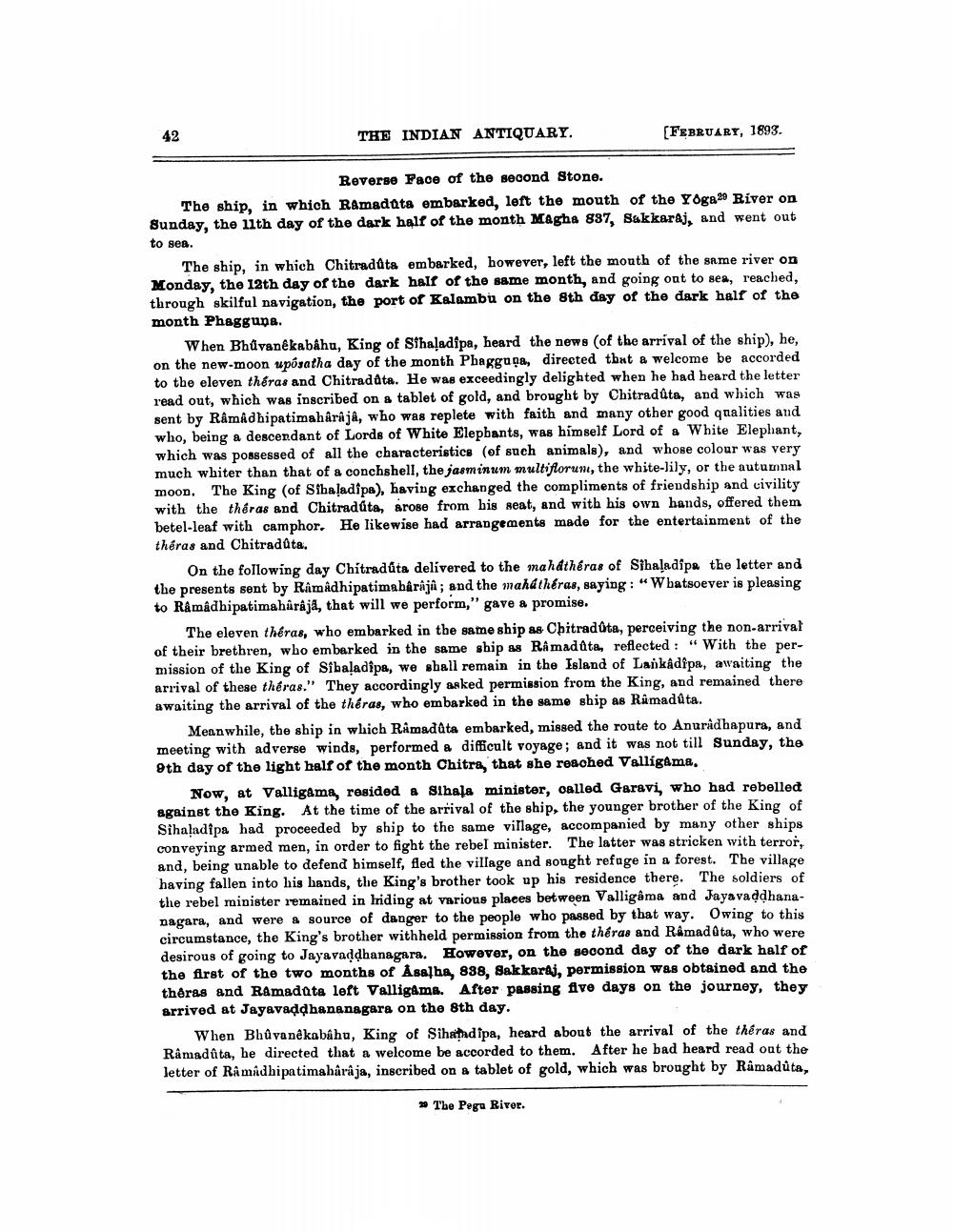________________
THE INDIAN ANTIQUARY.
(FEBRUARY, 1893.
Reverse Pace of the second Stone. The ship, in which Ramadata embarked, left the mouth of the Yoga 20 River on Sunday, the 11th day of the dark half of the month Magha 887, Sakkaraj, and went out to sea
The ship, in which Chitraduta embarked, however, left the mouth of the same river on Monday, the 12th day of the dark half of the same month, and going out to sea, reached, through skilful navigation, the port of Kalambu on the 8th day of the dark half of the month Phaggupa.
When Bhüvanêkabáhu, King of Sthaladipa, heard the news of the arrival of the ship), he, on the new-moon uposatha day of the month Phagguna, directed that a welcome be accorded to the eleven théras and Chitradata. He was exceedingly delighted when he had heard the letter read out, which was inscribed on a tablet of gold, and brought by Chitraduta, and which was sent by RâmAdhipatimahârâjâ, who was replete with faith and many other good qualities and who, being a descendant of Lords of White Elepbants, was himself Lord of a White Elephant, which was possessed of all the characteristics (of such animals), and whose colour was very much whiter than that of a conchshell, the jasminum multiflorun, the white-lily, or the autumnal moon, The King (of Sibaladipa), having exchanged the compliments of friendship and civility with the théras and Chitraduta, arose from bis seat, and with his own hands, offered them betel-leaf with camphor. He likewise had arrangements made for the entertainment of the théras and Chitradata.
On the following day Chitradűta delivered to the mahdthéras of Sthaladípe the letter and the presents sent by Ramadhipatimabârâjâ; and the maha théras, saying: “Wbatsoever is pleasing to Ramadhipatimaharaja, that will we perform," gave a promise.
The eleven théras, who embarked in the same ship as Chitradota, perceiving the non-arrival of their brethren, wbo embarked in the same ship as Ramadata, reflected : " With the permission of the King of Sibaladipa, we shall remain in the Island of Lankadipa, awaiting the arrival of these théras." They accordingly asked permission from the King, and remained there awaiting the arrival of the théras, who embarked in the same ship as Ramadata.
Mennwhile, the ship in which Ramadata embarked, missed the route to Anuradhapura, and meeting with adverse winds, performed a difficult voyage, and it was not till Sunday, the 9th day of the light half of the month Chitra, that she reached Valligama.
Now, at Valligama, resided a Shala minister, called Garavi, who had rebelled against the King. At the time of the arrival of the ship, the younger brother of the King of Siha?adipa had proceeded by ship to the same village, accompanied by many other ships conveying armed men, in order to fight the rebel minister. The latter was stricken with terror, and, being unable to defend himself, fled the village and sought refage in a forest. The village having fallen into his hands, the King's brother took up his residence there. The soldiers of the rebel minister remained in Iriding at various places between Valligâma and Jayavaddhananagara, and were a source of danger to the people who passed by that way. Owing to this circumstance, the King's brother withheld permission from the théras and Ramad@ta, who were desirous of going to Jayavaddhanagara. However, on the second day of the dark half of the first of the two months of Åsalha, 888, Sakkaraj, permission was obtained and the thêras and Ramadata loft Valligams. After passing five days on the journey, they arrived at Jayavaddhananagara on the 8th day.
When Bhûvanēkabâhu, King of Sihatadipa, heard about the arrival of the théras and Ramad üta, he directed that a welcome be accorded to them. After he bad heard read out the letter of Ramadhipatimahârâ ja, inscribed on a tablet of gold, which was brought by Râmadůta,
» The Pega River.




